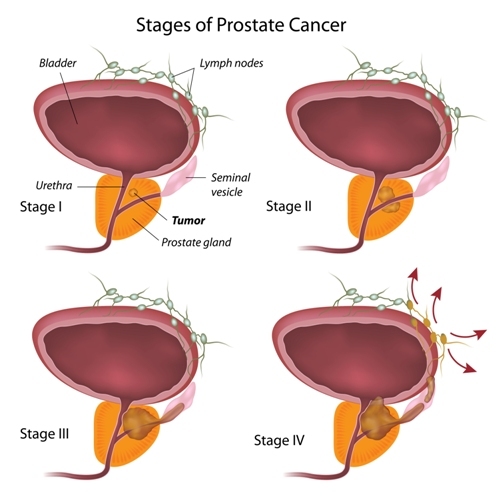The prostate gland is a muscular gland found only in men. It is normally the size of a walnut and is situated in the lower abdomen. Specifically, it is located just underneath the bladder, and the urethra passes from the bladder, through the prostate gland, to the penis. Its main function is to produce prostate fluid, which is one of the major components which make up semen. Prostate fluid nourishes and protects sperm during intercourse and forms the bulk of ejaculate volume. People often forget that it needs to be checked regularly, either due to ignorance or embarrassment.
Breaking Down the Taboo
There are many adverts on TV encouraging men over the age of 50 to be more aware of their prostate health. The adverts are not trying to scare men, they are trying to diffuse the taboo surrounding the prostate gland. The NHS website has some excellent advice on the prostate and the problems that can occur. Another excellent source of advice is Prostate Cancer UK. All men have a prostate and it is important for their sex life, but few men know anything about their prostate or what can go wrong with it. According to a survey of men aged 45 and over by Prostate Cancer UK, 70% of them knew nothing about their prostate or the symptoms of prostate problems.
Problems with the Prostate Gland
The prostate gland often enlarges as men get older, but for two-thirds of men aged 50 or over this doesn’t cause any problems. In some cases, an enlarged prostate can press on the tube carrying urine from the bladder and cause urinary problems. This is known as benign prostatic hyperplasia (BPH). Another condition is the inflammation of the gland, called prostatitis. This is sometimes caused by an infection and makes urinating painful.
Prostate Cancer
A big fear among men is prostate cancer. Sometimes a single cell in the prostate starts to multiply out of control and cancer can develop. Many men over 70 have prostate cancer, even though most of them will never have it diagnosed or have any symptoms. Prostate cancer is the most common cancer in men in the UK, with more than 40,000 men diagnosed annually. Around 11,000 men die from it every year, making it the second most common cause of cancer deaths in men after lung cancer. The problem is that we are told that early detection is vital for treatment, but early prostate cancer normally has no symptoms whatsoever.
Some of the symptoms of prostate cancer below can also be caused by other prostate problems like:
- Needing to urinate often, especially at night
- Difficulty starting to urinate
- Straining to urinate or taking a long time to finish
- Pain when urinating or during sexual intercourse;
Other less common symptoms include pain in the lower back and blood in the urine.
Diagnosing Prostate Cancer
In the majority (80%) of cases, this is slow-growing cancer. It may stay undiagnosed because it never causes any symptoms or problems and they die from other causes before this cancer is a problem. In the other 20% of cases, the prostate cancer cells can grow quickly and move outside the prostate, spreading cancer to other parts of the body, such as the bones.
The risk of getting prostate cancer increases with age. Most men diagnosed with the condition are over 50 and survival rates of newly diagnosed prostate cancer patients have improved from 30% in the 1970s to 80% today. If a close relative diagnosed with prostate cancer, the risk of getting the disease is two-and-a-half times higher than the average man. The risk increases to 4.3x if the relative was diagnosed before the age of 60. It is also three times higher if he comes from an African or African-Caribbean background.
Researchers believe a diet high in saturated animal fats and red meat may be responsible for the high incidence of prostate cancer in Western countries. It is thought that reducing your intake of animal fat and eating more fruit and vegetables may lower the risk of prostate cancer developing or spreading. There is currently no prostate cancer screening programme on the NHS. It’s up to the individual if they want to get tested. But too many men put off going to their GP because they are afraid of a diagnosis of prostate cancer.
Helping the Prostate Gland
Getting checked may seem quite daunting and invasive, but it is simple and easy. Go to your doctor and tell them you want your prostate checked. They will ask you a few questions and then check it. Although this may be a little embarrassing and slightly uncomfortable, it is a quick, painless check with instant results. The doctor is feeling for an enlarged prostate and, yes, with a finger through your back passage. If they detect a problem, they may do some more tests or refer you to someone else. This does not mean you have cancer unless the doctor says otherwise after it has been confirmed. There are many other causes including infections, cysts or damage from an injury you may not have noticed.
If you are scared or embarrassed to go to your doctor, remember that they are there to help you. Their job is to discuss things like this and are used to people not knowing what to say. If you think you won’t be able to ask verbally, write it down and hand your note to the doctor. They will be very good at making you feel at ease.
For more information on training courses, visit our “Courses” page which also includes our First Responder and First Person on Scene (FPOS) Courses.

